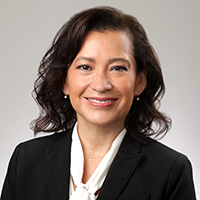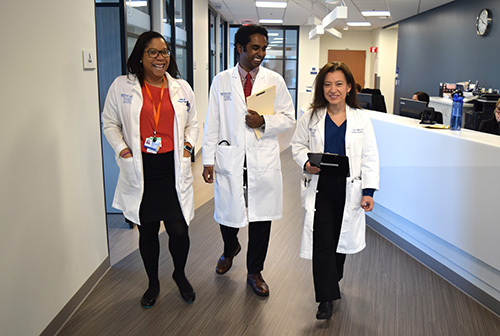
Martha Arellano, MD
"Decide what you want to achieve, have a timeline, become familiar with promotion criteria, and reach out to your mentoring team to make sure that they support you in achieving your goals."
This September we are featuring six of Winship's women healthcare professionals for Women in Medicine Month. We have asked them to share their perspectives on working at Winship and what their careers have been like as women in medicine.
Martha Arellano, MD, is a professor in the Department of Hematology and Medical Oncology at Emory University School of Medicine, and serves as associate director of the Division of Hematology. Dr. Arellano also serves as director of the Hematology and Medical Oncology Fellowship Program. Dr. Arellano specializes in the treatment of patients with leukemia and myelodysplastic syndromes, and her research is focused on developing immune-based therapies for hematological malignancies. She joined the faculty at Winship in 2006.
Do you see Winship as a place where women are supported and can advance in their careers?
Absolutely, many of the leaders at Winship are women.
What was your "road to promotion" like (hopefully it wasn't rocky!)?
I used to think that if I just do my job well, I would automatically get promoted. However, it takes more than that. It takes planning ahead and having a support network, to make sure that you are reaching the milestones needed for promotion. I have been fortunate to be part of a very supportive team, where the culture encourages women to excel and aspire to greatness. My work is, by no means, done here at Winship and Emory.
Do you have advice for other women physicians early in their career?
Yes. Decide what you want to achieve, have a timeline, become familiar with promotion criteria, and reach out to your mentoring team to make sure that they support you in achieving your goals.
Also, Dr. Lonial is absolutely right when he tells us to own our own CV. It's important to take credit for everything we do, and not to rely on someone else to do that. I also tell my younger counterparts to date everything (talks, seminars, etc) because you will need this information for your service/teaching portfolio.
What do you wish you knew when you were starting out that you have learned since then?
As a young faculty member, I used to say yes to everything I was asked to do, even if it wasn't necessary. I wanted to be a team player at all times. My former mentor, Dr. H. Jean Khoury once told me to "stop saying yes to everything." He told me to negotiate/trade and consider how doing something more would fit into my career goals. There is a balance. You can be a team player while also looking out for your career and your wellness. I think I am better at asking for what I need and I am getting better at saying no/maybe (sometimes).

Dr. Arellano leads the Hematology and Medical Oncology Fellowship Program where she enjoys mentoring the next generation of medical oncologists. (Photo taken pre-pandemic.)

